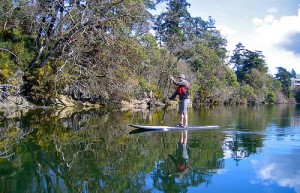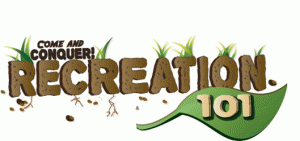
The sport of stand-up paddle boarding, SUP for short, is expanding rapidly in the Great Lakes region. Photo: vikapproved (flickr)
If you want to know if that latest fitness trend lives up to the hype, you can find out for free in Michigan’s state parks.
They’re offering more than just trail running.
Beginner kayaking, windsurfing, and even stand-up paddle boarding – what the Wall Street Journal recently referred to as the “fitness rage of the summer” – are just a few of the classes in Recreation 101. The program is designed to get people into state parks. Local outfitters volunteer their expertise and gear in beginner classes that also include archery, disc golf and orienteering.
“If you ever wanted to try something outside, but you don’t have gear because it’s expensive, or don’t have someone to teach you, we offer expert instructor to show you how,” said Maia Stephens, a Recreational Programmer for the Michigan Department of Natural Resources. “The gear is provided so you don’t have to worry about making an investment in something you don’t know how to do.
“It started last year, with the 2011 season,” Stephens said. “We had 87 events and 4,000 people participated. We’re offering 500 events this year. It seems to be growing quite well.
While Stephens supports the opportunities offered at Michigan’s state parks, other groups aren’t thrilled. Go Get Outdoors, a group based in southeast Michigan, is devoted to the protection of the state’s natural resources. Members believe the state parks need upkeep, not classes.
“The DNR has lost their focus,” said Robert Golda, an avid hiker and the head of Go Get Outdoors. “They’re focused on controlling everyone’s recreation experience.
“I don’t need them to tell me I should kayak,” he said. “If I want to go, I’ll find my own group and go do it.”
But for some outfitters, Recreation 101 provides them the opportunity to introduce their sport to new users.
One of the bigger hits this summer is stand-up paddle boarding, or SUP. Paddle the Mitten, a southeast Michigan outfitter, normally offers a private lesson for $65, but offered free instruction for Rec 101.
“Throughout the summer we’ve done eight programs, two lessons a day,” said Linda Brown, stand-up paddle board professional and owner of Paddle the Mitten. And those classes are usually full.
Her father inspired her volunteer efforts to bring the sport inland.
“My father said, ‘You should look at state parks for something you can do in nature to get people on water to experience Michigan in a different way,’” Brown said.
His advice matches the goals of Recreation 101.
“The goal of Rec 101, in a way, is to get people who don’t normally come to the park to get there and see it in a different way,” she said.
Brown wants to expand stand-up paddle boarding throughout the state.
“State parks and the Michigan DNR are a great outlet for it,” she said. “We can spread the word, spread the aloha.”
Classes and the park entrance are free for residents with a recreation passport. The two-year-old passport program

A DNR officer demonstrates the finer points of camping. Photo: Michigan DNR
allows entry onto any state-owned land. Instead of the normal $24 a year park pass, people can sign up for a $10 recreation passport when they renew car registration
The Recreation 101 program is an offshoot of the agency’s first time camper program to bring people back into the woods.
“People were not signing up to go camping,” Stephens said. “People didn’t know how, and didn’t have gear.
“We provided gear, and expert instruction on how to set up a tent and start a campfire.”
The program created return campers – about 22 percent are still camping, Stephens said.
That’s the kind of success the DNR hopes to see with Recreation 101.
The program encourages lifestyle and hobby changes, Stephens said. “We want people outside in Michigan’s woods and waters.”
Recreation versus Conservation — Are they two Different Goals?
Golda also wants people in the parks. He initially supported Recreation 101 and was involved in several of its events in southeast Michigan, including volunteering to help prepare banners for its kick-off last summer. But a basic philosophical difference between Golda and the program changed his attitude.

The Recreation 101 banner Photo: Michigan DNR
“The banners said Conquering Recreation 101,” he said. He immediately sent out e-mails to the Department of Natural Resources explaining that he felt that the idea of conquering nature sent a bad message to the public.
“They think we are supposed to conquer our natural world” Golda said. “That’s a horrible lesson to teach a child — ‘here, go conquer that tree.’
“People ask me why hasn’t the DNR taken passport money to repair outhouses or potholes in a park entrance road.”
Golda would rather see the parks maintain trails and remove invasive species — which he says is left up to volunteer groups like the Eagle Scouts.
“Who cares if you have a Recreation 101 program in a park that’s taken over by invasive species.
“There’s a trail I hike to get back to a fen area that’s not usable anymore,” Golda said. “Fix that and I’ll create my own recreational experience.”
Stephens doesn’t see recreation and conservation as an either/or.
“I consider them very, very similar, she said. That’s a challenge we talk about all the time.” She points out that part of the motto of Michigan’s DNR includes the phrase “for the enjoyment of Michigan residents.”
“Finding a balance, that is really our role,” Stephens said.
The reality is that conservation takes money.
“Everybody wants our resources and lands to be preserved and protected forever,” she said. “That takes funding.”
People are more apt to support parks that are a part of their daily lives, she said.
For Sleepy Hollow park ranger Tim Machowicz, the new programs are part of a grass roots effort to rebuild Michigan’s population of hunters and anglers. His park offers classes in archery and fishing.
“It’s a next generation introduction,” he said. “There’s not the family connection there used to be.”
Only five people showed up to the park’s first archery class, but those numbers increased to 65 people at the second class. The most recent class had 45 participants.
“We are introducing sports to kids,” Machowicz said. “It gets the whole family into the park.”
For Stephens, whose disc golf throw improved from her own participation in Recreation 101, the goal is for her hands-on experiences with natural resources to be a part of the lives of all Michigan residents.
“I want them to have Michigan memories too,” she said.
Regardless of criticism, the DNR has no plans to slow the program. Stephens reports that next year the focus is to make the parks a health and fitness destination.
“We have four seasons of recreation opportunities if you are willing to hike in winter or get creative,” she said. “People sit on couch because they can’t afford gym.
“The DNR is looking to partner with gyms and rehabilitation facilities to offer more programs,” she said.
Yoga and tai chi classes are already planned for state park beaches. Brown plans to offer stand-up paddle boarding in combination with yoga and Pilates.
Interested in Recreation 101? Upcoming classes can be found here, through the Department of Natural Resources.
